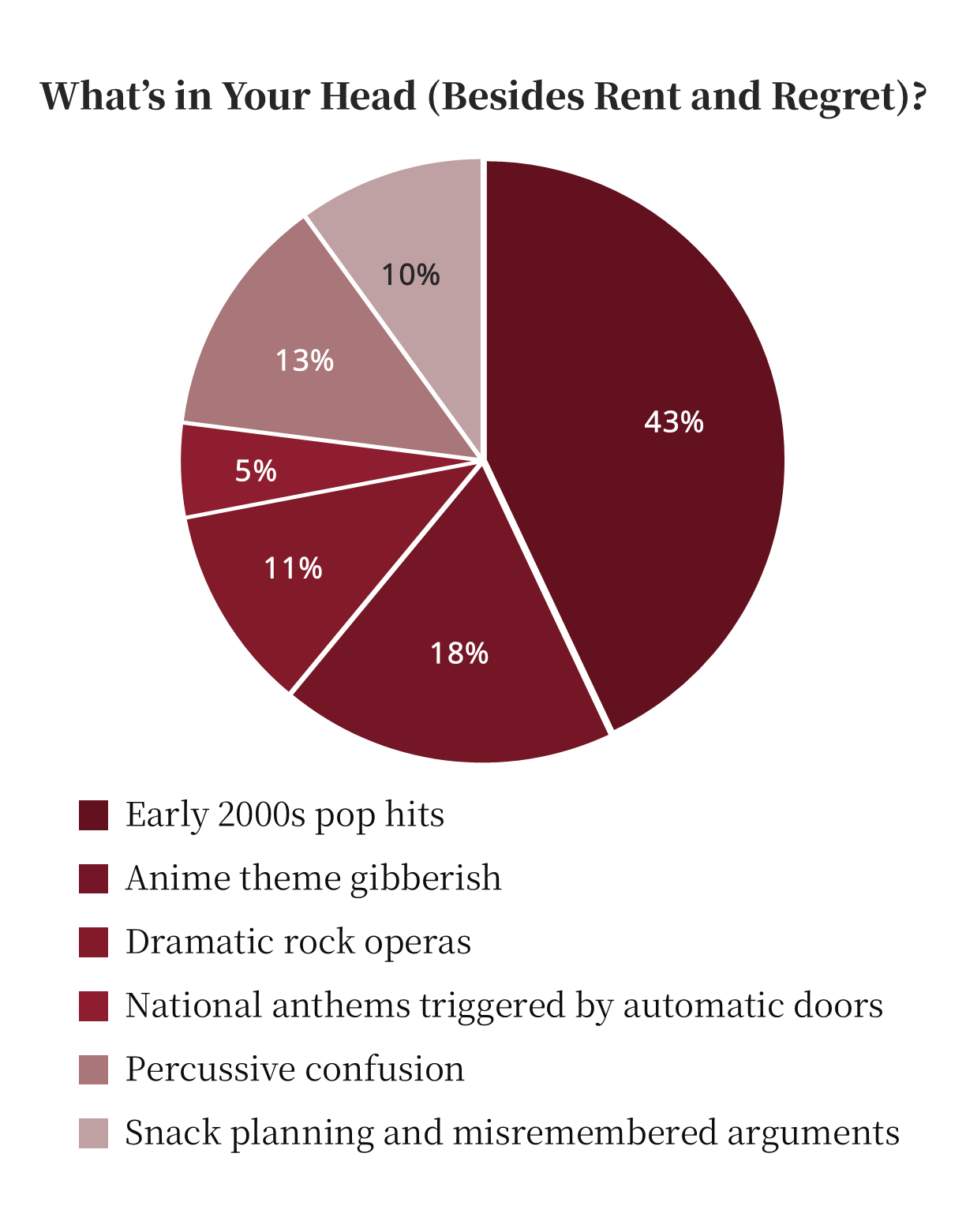In a study that has left neuroscientists rhythmically nodding in confusion, researchers at the International Cognition Mapping Institute (ICMI) have confirmed that up to 90% of human cognitive activity consists of recycled song lyrics, most of which are vaguely remembered and partially misquoted.
Using cutting-edge techniques such as neural resonance tracking, earworm tomography, and EEG karaoke indexing, scientists were able to visualize thought patterns in real time. “Frankly, most brains are just looping choruses at moderate emotional volume,” said lead researcher Dr. Ren Ishikawa.
Here are the key findings from the research:
43% of internal cognitive activity was attributed to early 2000s pop hits, often surfacing during basic tasks like brushing teeth, filling out forms, or passing mild acquaintances.
18% consisted of anime opening themes remembered only phonetically, with frequent internal repetitions of “wow wow wow wow wow” and “fly high, destiny… Let’s go.“
11% focused exclusively on the operatic portion of Bohemian Rhapsody, especially during stressful events like job interviews or dentist appointments.
5% involved national anthems triggered by elevators, public escalators, or being mildly patriotic while holding a grocery basket.
13% remained unclassifiable due to tuneless humming or internal beatboxing that lacked lyrical structure but still disrupted rational decision-making.

The TTT field team spoke to dozens of commuters, office workers, and stationery shop employees in central Tokyo. While reactions varied, the findings were oddly consistent.
“I tried solving a logic puzzle and ended up singing the chorus to Survivor’s ‘Eye of the Tiger’ instead. I didn’t survive,” admitted Taiyo, a systems analyst.
“The other day, I made a difficult life choice while unknowingly whispering ‘Let it go, let it go…’ I haven’t let go of anything since,” said Naomi, a freelance designer.
“I say ‘good morning’ and immediately hear ‘Good morning, Baltimore’. I’ve never been to Baltimore. Or to morning,” mumbled Ryo, whose job description remains unclear.
“Sometimes I start a serious conversation and my brain slaps me with ‘Oops!… I Did It Again’. I haven’t trusted myself since 2006,” confessed Anzu, a kindergarten teacher.
Several respondents admitted to feeling emotional during meetings solely because Gurenge by LiSA was playing in their heads. Some cried.
Institutional Response
In response to an inquiry from Tokyo Tofu Tribune, a spokesperson for the Mental Hygiene Bureau of Japan commented: “Our current emotional protocols do not account for spontaneous lyrical cognition. While harmless in isolated incidents, we are investigating cumulative effects such as spontaneous dance outbreaks and unprompted key changes during financial audits.”
The Bureau has convened a subcommittee to explore lyrical quarantine zones in key metro areas, and the possibility of an Earworm Suppression Protocol during fiscal meetings. Meanwhile, the National Memory Archive has requested clarification on whether the phrase “I wanna dance with somebody” qualifies as historical recall or emotional leakage.
They declined to confirm rumors that future convenience store Emotion Meal Packs will include “Unsolicited Karaoke Memory Blend” and “Anticipatory Chorus Booster (Holiday Edition).”
Recommendations From Researchers
Researchers advise the public to:
- Limit exposure to playlist auto-suggestions during emotionally volatile hours (e.g. mornings, mid-commute, pre-tax filing).
- Carry a neutral mental anchor, such as internal math equations or the plot of a mediocre documentary.
- Avoid key phrases like “hello,” “I’m fine,” and “what’s love got to do with it,” as they may trigger involuntary lyrical loops.
Dr. Ishikawa added, “We used to think thoughts were tools of reason. Now we know they’re just mixtapes with a strong opinion. We are all living in a cerebral karaoke bar with bad lighting and no exit.”
Editorial Note: A follow-up study is underway to determine whether the remaining 10% of human thought consists of imagined arguments or snack planning.




